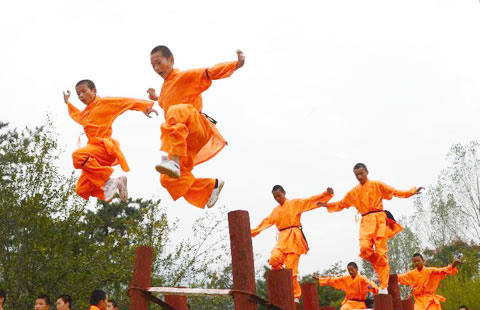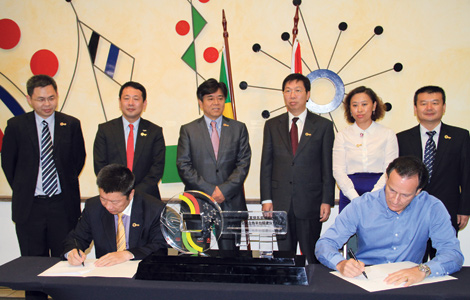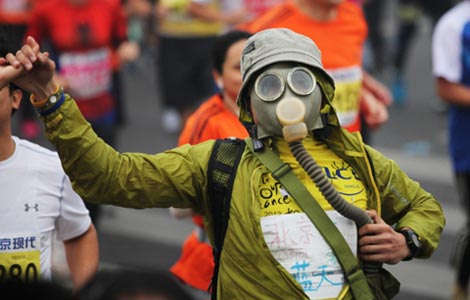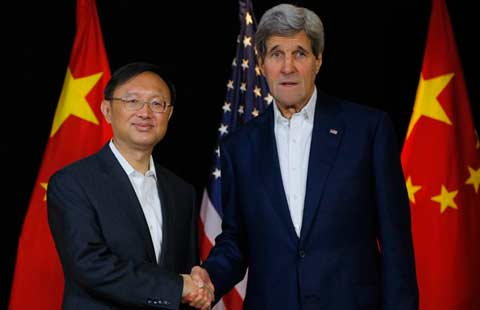Turkey to let Iraqi Kurds reinforce Kobani as US drops arms to defenders
Updated: 2014-10-20 19:40
(Agencies)
|
||||||||
|
Turkish Kurds watch the Syrian town of Kobani from a hill near the Mursitpinar border crossing, on the Turkish-Syrian border in the southeastern town of Suruc in Sanliurfa province October 20, 2014. Turkish Foreign Minister Mevlut Cavusoglu said on Monday that Turkey was facilitating the passage of Iraqi Kurdish peshmerga fighters to Kobani to aid Syrian Kurds defending the town against Islamic State militants. [Photo/Agencies] |
ANKARA/BEIRUT - Turkey said on Monday it would allow Iraqi Kurdish fighters to reinforce fellow Kurds in the Syrian border town of Kobani, while the United States air-dropped arms for the first time to help the defenders resist an Islamic State assault.
Washington said the arms had been supplied by Iraqi Kurdish authorities and had been dropped near Kobani, which came under Islamic State attack in September and is now besieged to the east, west and south, and bordered to the north by Turkey.
Turkey has stationed tanks on hills overlooking Kobani but has refused to help the Kurdish militias on the ground without striking a broader deal with its NATO allies on intervening in the Syrian civil war, saying action should also be taken against Syrian President Bashar al-Assad.
However, Foreign Minister Mevlut Cavusoglu told a news conference that Turkey was facilitating the passage of Iraqi Kurdish peshmerga forces which have also fought Islamic State when the militants attacked the Kurds' autonomous region in Iraq over the summer. He gave no details.
Turkey's refusal to intervene in the battle against Islamic State, which has seized large areas of Syria and neighbouring Iraq, has led to growing frustration in the United States.
The policy has also provoked lethal riots in southeastern Turkey by Kurds furious at Ankara's refusal to help Kobani or at least open a land corridor for volunteer fighters and reinforcements to go there.
Ankara views the Syrian Kurds with deep suspicion because of their ties to the PKK, a group that waged a decades-long militant campaign for Kurdish rights in Turkey.
Earlier the US Central Command said it had delivered weapons, ammunition and medical supplies to allow the Kurdish fighters to keep up their resistance in the town which is called Kobani in Kurdish and Ayn al-Arab in Arabic.
The main Syrian Kurdish armed group, the YPG, said it had received "a large quantity" of ammunition and weapons.
Redur Xelil, a spokesman for the YPG, said the weapons dropped overnight would have a "positive impact" on the battle and the morale of fighters who have been out-gunned by Islamic State. But he added: "Certainly it will not be enough to decide the battle."
"We do not think the battle of Kobani will end that quickly. The forces of (Islamic State) are still heavily present and determined to occupy Kobani. In addition, there is resolve (from the YPG) to repel this attack," he told Reuters in an interview conducted via Skype.
He declined to give more details on the shipment.
The United States began carrying out air strikes against Islamic State targets in Iraq in August and about a month later started bombing the militant group in neighbouring Syria.
However, the resupply of Kurdish fighters marks an escalation in the US effort to help local forces beat back the radical Sunni militant group in Syria. It points to the growing coordination between the US military and a Syrian Kurdish group that had been kept at arms' length by the West due partly to the concerns of NATO member Turkey.
Washington has pressed Ankara to let it use bases in Turkey to stage the air strikes, and a Turkish foreign ministry official said the country's airspace had not been used during the drops on Kobani.
US President Barack Obama gave advance notice to his Turkish counterpart Tayyip Erdogan of its plans to deliver arms to the Syrian Kurds, a group Turkey views with distrust because of its links to Turkish Kurds who have fought an insurgency in which 40,000 people were killed.
"President Obama spoke to Erdogan yesterday and was able to notify him of our intent to do this and the importance that we put on it," one senior US official told reporters.
US officials, speaking in a conference call, described the weapons delivered as "small arms" but gave no details.
Escalated US air strikes on Islamic State in and around Kobani have helped to slow its progress there in the last week. The Kurds say the US military has been coordinating the air strikes with them, helping to make them more effective.
The Syrian Observatory for Human Rights, which tracks the war in Syria using sources on the ground, said there had been two new air strikes on Islamic State positions after midnight.

 10th International Shaolin Wushu Festival opens
10th International Shaolin Wushu Festival opens
 What they say - Frontline staff in the battle against Ebola
What they say - Frontline staff in the battle against Ebola
 Biz clubs deepen cooperation
Biz clubs deepen cooperation
 Beijing marathon concludes in smog
Beijing marathon concludes in smog Highlights of Shanghai Fashion Week
Highlights of Shanghai Fashion Week
 Yang, Kerry meet in Boston ahead of APEC
Yang, Kerry meet in Boston ahead of APEC
 Writer Lu Xun's works honored in NY
Writer Lu Xun's works honored in NY
 Huawei exhibits products in Brazil
Huawei exhibits products in Brazil
Most Viewed
Editor's Picks

|

|

|

|

|

|
Today's Top News
College football touches down to China
China-US cyber security talks hard to resume
Alibaba joins global shipping effort
Biz clubs deepen cooperation
Brazil needs its own version of China Dream, expert says
Latin America infrastructure needs more investment
Runners resort to face masks
Support dwindling for HK protesters
US Weekly

|

|







